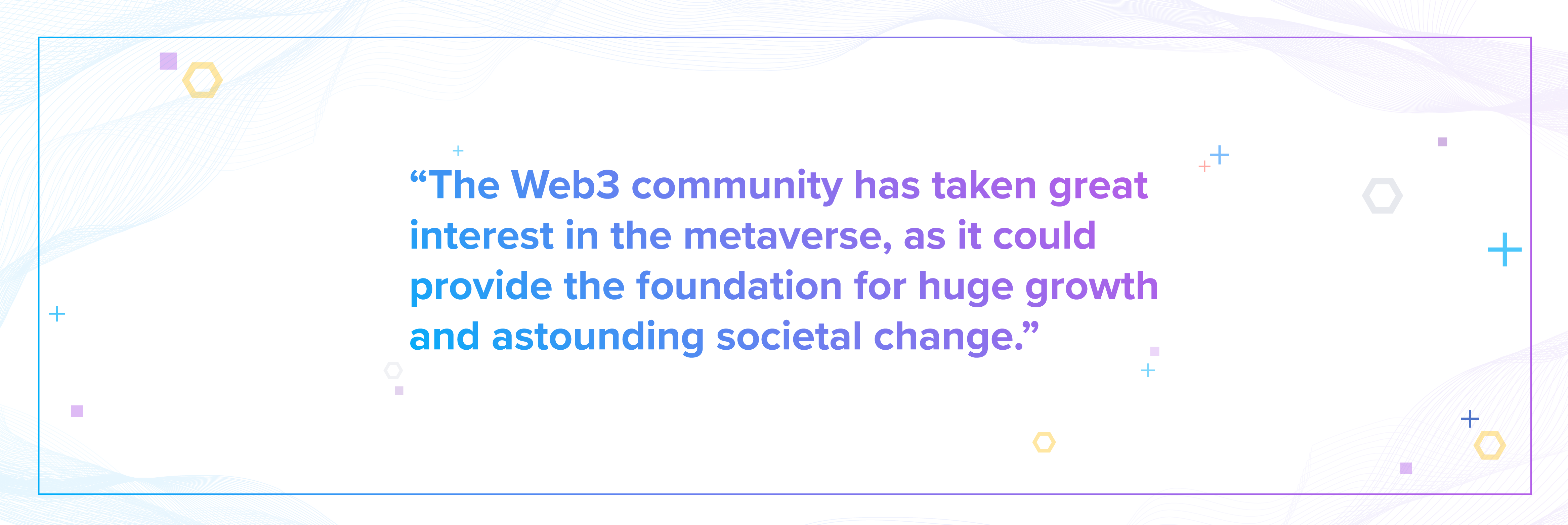The concept of the metaverse is part of a larger movement within the technology community; one that is reassessing many of the things to which we’ve become accustomed since the age of the World Wide Web began. The internet’s first phase, known as Web 1.0, was dominated by static pages and elements aligned by frames and tables. With only a few companies and individuals producing (fairly basic) content, most of Web 1.0's users were there to consume information, making it a network of content delivery and personal web pages. Currently, we are in the era of Web 2.0, a time of user-generated content and end-user interoperability. On this social web, pages are now designed for a dynamic back and forth between the developer and user. Unlike with the internet’s first iteration, people can now widely add commentary by sharing their opinions and experiences through blogs, podcasts, tagging, content voting, and (of course) social media. With Web 3.0, or Web3, the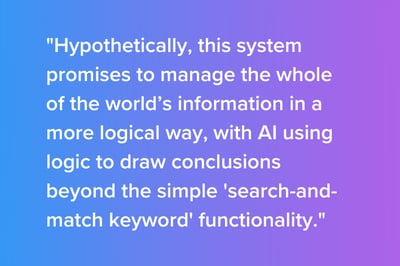 concept of the internet may evolve in several dramatic ways by incorporating new concepts and technologies. In this decentralized iteration of the web, users would have the ability to select when, where, and with whom they share personal data. Web3 users would theoretically have more control of their personal data, with things like blockchain and token-based economics at the core of the concept. Hypothetically, this system promises to manage the whole of the world’s information in a more logical way, with AI using logic to draw conclusions beyond the simple “search-and-match keyword” functionality.
concept of the internet may evolve in several dramatic ways by incorporating new concepts and technologies. In this decentralized iteration of the web, users would have the ability to select when, where, and with whom they share personal data. Web3 users would theoretically have more control of their personal data, with things like blockchain and token-based economics at the core of the concept. Hypothetically, this system promises to manage the whole of the world’s information in a more logical way, with AI using logic to draw conclusions beyond the simple “search-and-match keyword” functionality.
The Web3 community has taken great interest in the metaverse, as it could provide the foundation for huge growth and astounding societal change. Imagine a world where you plug into a headset in your living room to start your workday. On your way to the “office,” you stop and purchase an NFT as a present for your roommate using tokens from your digital wallet. Ironically, the process wouldn’t be that different from buying boosts and power-ups in a video game. Web3 seeks to remove intermediaries from online activities. The fact is, only pieces of this next iteration exist today, and the ones that do are not entirely scalable. It’s a new frontier, and that will mean trial and error. And while Web3 is primarily concerned with who owns and controls the internet of tomorrow (and conversely, any potential lack of ownership), the metaverse is all about how that internet will be experienced. The two concepts are hardly at odds. In fact, there’s likely to be a great deal of interaction and crossover.
Like Web3, future metaverses will theoretically be built on blockchain technology, which would enable users to have digital ledgers and logs that are more efficient, transparent, and secure, without obstructive middlemen. But society loves an orderly structure, so how will these independent traders and multi-verified ledgers coalesce in new communities? One indication is the advent of the DAO (decentralized autonomous organization). DAOs are member-owned communities without any form of central leadership. Sure, the concept may sound like something out of a doomy James Bond film, but the concept has a lot of potential for good. After all, these DAOs offer the potential for truly democratic decision-making. They provide a safe way of communicating and interacting with internet strangers and committing resources to specific causes. And they are changing 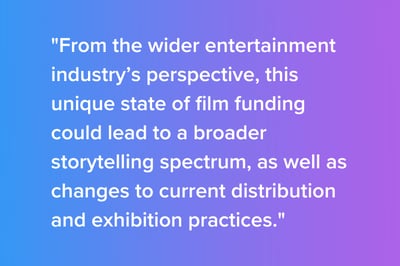 the very nature of ownership, which can be a potential disruptor. With decentralized currency comes decentralized organizations who don’t want to be regulated. These DAOs are people with no inherent hierarchal structure. They vote. They rule by democracy. They are the ledger. Imagine you’re a filmmaker in Hollywood, trying to get your masterpiece in front of the cameras … DAO investments could allow multiple buyers to invest in exchange for partial ownership rights. From the wider entertainment industry’s perspective, this unique state of film funding could lead to a broader storytelling spectrum, as well as changes to current distribution and exhibition practices. Recently, a DAO floated the idea of acquiring the fated Blockbuster brand in order to (as they stated in a post on a Discord server in 2021) “turn Blockbuster into the first-ever DeFilm (decentralized film) streaming platform.” The plan has since fallen apart, but these resilient DAOs are already formulating an alternative approach to creating a decentralized streaming platform. If you picture these decentralized groups operating in the metaverse, you’ll begin to see the potential for change in just about every corner of society. And that potential expands exponentially if you consider the futurist ideal of a singular virtual environment.
the very nature of ownership, which can be a potential disruptor. With decentralized currency comes decentralized organizations who don’t want to be regulated. These DAOs are people with no inherent hierarchal structure. They vote. They rule by democracy. They are the ledger. Imagine you’re a filmmaker in Hollywood, trying to get your masterpiece in front of the cameras … DAO investments could allow multiple buyers to invest in exchange for partial ownership rights. From the wider entertainment industry’s perspective, this unique state of film funding could lead to a broader storytelling spectrum, as well as changes to current distribution and exhibition practices. Recently, a DAO floated the idea of acquiring the fated Blockbuster brand in order to (as they stated in a post on a Discord server in 2021) “turn Blockbuster into the first-ever DeFilm (decentralized film) streaming platform.” The plan has since fallen apart, but these resilient DAOs are already formulating an alternative approach to creating a decentralized streaming platform. If you picture these decentralized groups operating in the metaverse, you’ll begin to see the potential for change in just about every corner of society. And that potential expands exponentially if you consider the futurist ideal of a singular virtual environment.
And that is the big unknown: will metaverses be limited to their current forms as disparate mini worlds, or will these different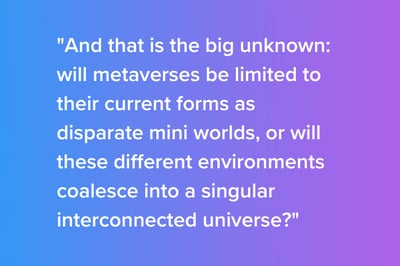 environments coalesce into a singular interconnected universe? In a way, this is really a question about people. How will we interact, socialize, and fulfill our societal duties? Unlike the internet of today, the metaverse of tomorrow should belong to us all, and that will require some sort of regulation—perhaps courtesy of the democratized DAOs. Younger generations are already primed to jump in feet first, with social media platforms and user-generated content dominating the cultural landscape. According to the 2022 Digital Media Trend report, Gen Z firmly stated that their favorite pastime is gaming, and the potential for video games (and experiences) in the metaverse is boundless. In 2021, the market for meta technology stood at $63.83 billion, and it’s expected to rise from $100.27 billion in 2022 to $1.52 trillion (you read that right) by 2029 at 47.6% CAGR during the forecast period. And as Web3 takes hold, the market is expected to rapidly pick up steam. According to Market Research Future (MRFR), the global Web 3.0 Blockchain market could reach $6.18 billion by 2023, growing further at 44.6% CAGR during the assessment period (2022-2030).
environments coalesce into a singular interconnected universe? In a way, this is really a question about people. How will we interact, socialize, and fulfill our societal duties? Unlike the internet of today, the metaverse of tomorrow should belong to us all, and that will require some sort of regulation—perhaps courtesy of the democratized DAOs. Younger generations are already primed to jump in feet first, with social media platforms and user-generated content dominating the cultural landscape. According to the 2022 Digital Media Trend report, Gen Z firmly stated that their favorite pastime is gaming, and the potential for video games (and experiences) in the metaverse is boundless. In 2021, the market for meta technology stood at $63.83 billion, and it’s expected to rise from $100.27 billion in 2022 to $1.52 trillion (you read that right) by 2029 at 47.6% CAGR during the forecast period. And as Web3 takes hold, the market is expected to rapidly pick up steam. According to Market Research Future (MRFR), the global Web 3.0 Blockchain market could reach $6.18 billion by 2023, growing further at 44.6% CAGR during the assessment period (2022-2030).
Adoption of the metaverse is already picking up speed, but what does that mean for things like the digital marketplace and the entertainment industry? If (and perhaps when) the many unique metaverses one day find themselves in concert, how does that affect commerce and interaction? According to venture capitalist Matthew Ball, “The metaverse will grow the digital economy, which is the primary growth driver of the world economy.” Good news, right? Growing economic numbers are rarely unwelcome, but it’s important to note that both unique and unified metaverses will more than likely have their own economies, which will be quite different from the current in-app purchase model favored by video games and social platforms. In that model, money flows one way: from the user to the platform owner. In the metaverse model, ownership is diversified. As a user, you would be able to earn money from goods and services from other platform participants. Like cryptocurrency, NFTs will be a vital part of any metaverse economy (check out our blog on NFTs for more). This is one of the many reasons that companies like Meta are so interested, and they are set on understanding how to better commercialize and monetize the new virtual environment.
As decentralized and democratized ecosystems, these proto-metaverse environments are fueled by the booming creator economy (yep—we’ve got a piece on that, too). Popular trends like fan edits, fan fiction, and content based on existing IP can all be showcased in this arena, bringing together enthusiasts from around the world. Even now, there is a trend in gaming and social media that encourages online platforms to cultivate their own unique virtual identities with things like avatars, 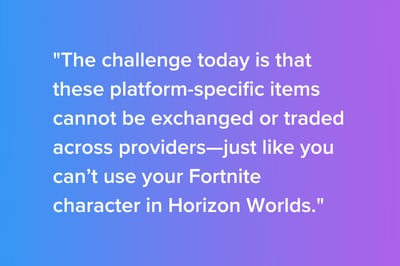 purchasable items, and unique actions. The challenge today is that these platform-specific items cannot be exchanged or traded across providers—just like you can’t use your Fortnite character in Horizon Worlds. In the future, a single metaverse would allow for more personal freedom, empowering users to create a persona or avatar that can travel between platforms, performing tasks and buying things as they would in the “real” world. This would push the metaverse beyond a simple technological evolution into more of a societal shift.
purchasable items, and unique actions. The challenge today is that these platform-specific items cannot be exchanged or traded across providers—just like you can’t use your Fortnite character in Horizon Worlds. In the future, a single metaverse would allow for more personal freedom, empowering users to create a persona or avatar that can travel between platforms, performing tasks and buying things as they would in the “real” world. This would push the metaverse beyond a simple technological evolution into more of a societal shift.
What does all of this mean to business and finances in the virtual environment? As the world changes, so will its commerce. To find out how, tune in for our final installment of On the Horizon: The Metaverse and Web3...
